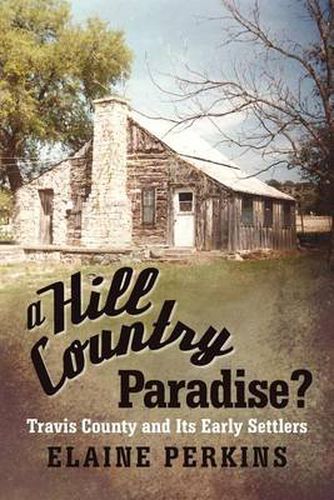Readings Newsletter
Become a Readings Member to make your shopping experience even easier.
Sign in or sign up for free!
You’re not far away from qualifying for FREE standard shipping within Australia
You’ve qualified for FREE standard shipping within Australia
The cart is loading…






This title is printed to order. This book may have been self-published. If so, we cannot guarantee the quality of the content. In the main most books will have gone through the editing process however some may not. We therefore suggest that you be aware of this before ordering this book. If in doubt check either the author or publisher’s details as we are unable to accept any returns unless they are faulty. Please contact us if you have any questions.
In the mid-1800s, land speculators said that Western Travis County in Texas would be a paradise, a perfect place to grow crops, raise livestock, and build a life. Settlers were seduced by such stories, and many of them-including a large segment of German immigrants-made their way to this "promised" land. What they found was, for the most part, an arid area of cedar trees, poor soil, rocks, and snakes.
Still, these hardy people carved out a good life for themselves, making the best of what they had, and their descendents continue to live in the area today. Historian and Travis County resident Elaine Perkins relates the tales of these settlers in A Hill County Paradise , a moving testament to the pioneer spirit that made this place prosperous.
From the earliest settlers through two world wars, Perkins reveals the tragedies and triumphs of those who made the county their home. This historical record brings this Texas county's past to life, recalling residents fighting for the Confederacy in the Civil War, breaking ground for a new homestead, rustling cattle, taking advantage of burgeoning business opportunities, squabbling, and heralding the arrival of electricity.
Vivid details, solid research, and an intriguing narrative make A Hill County Paradise not only educational, but also entertaining, securing the memory of this county's past for future generations.
$9.00 standard shipping within Australia
FREE standard shipping within Australia for orders over $100.00
Express & International shipping calculated at checkout
This title is printed to order. This book may have been self-published. If so, we cannot guarantee the quality of the content. In the main most books will have gone through the editing process however some may not. We therefore suggest that you be aware of this before ordering this book. If in doubt check either the author or publisher’s details as we are unable to accept any returns unless they are faulty. Please contact us if you have any questions.
In the mid-1800s, land speculators said that Western Travis County in Texas would be a paradise, a perfect place to grow crops, raise livestock, and build a life. Settlers were seduced by such stories, and many of them-including a large segment of German immigrants-made their way to this "promised" land. What they found was, for the most part, an arid area of cedar trees, poor soil, rocks, and snakes.
Still, these hardy people carved out a good life for themselves, making the best of what they had, and their descendents continue to live in the area today. Historian and Travis County resident Elaine Perkins relates the tales of these settlers in A Hill County Paradise , a moving testament to the pioneer spirit that made this place prosperous.
From the earliest settlers through two world wars, Perkins reveals the tragedies and triumphs of those who made the county their home. This historical record brings this Texas county's past to life, recalling residents fighting for the Confederacy in the Civil War, breaking ground for a new homestead, rustling cattle, taking advantage of burgeoning business opportunities, squabbling, and heralding the arrival of electricity.
Vivid details, solid research, and an intriguing narrative make A Hill County Paradise not only educational, but also entertaining, securing the memory of this county's past for future generations.